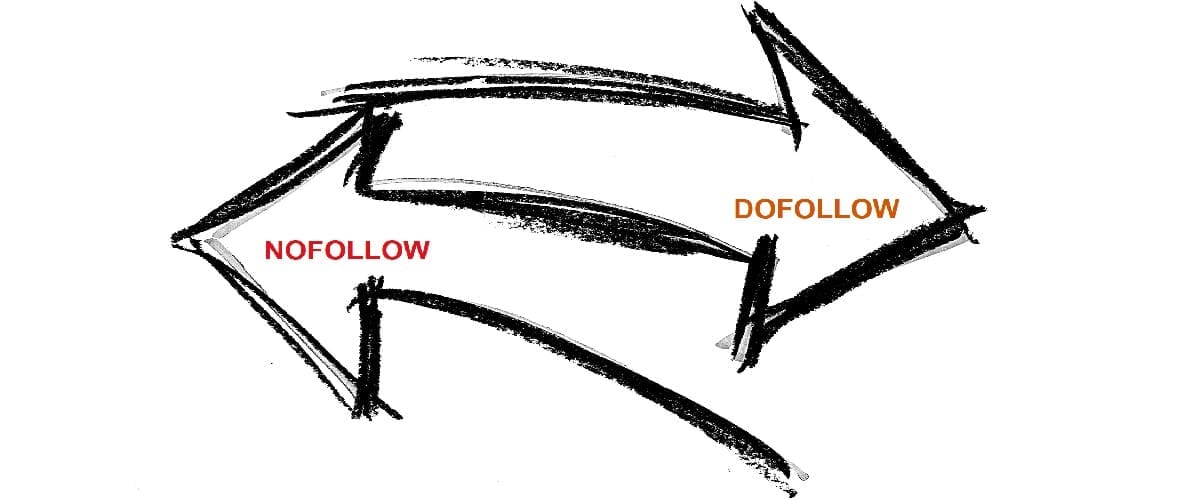Let’s face it: the more backlinks you have, the higher you rank in search results. However, not all links have equal value: some may push your site up the list, while others could damage its ranking. Dofollow links must come from high quality websites to have a real effect. They tell Google’s bots to consider them when computing Google rankings. So, let’s take a deeper look at Dofollow links.
Nofollow vs. Dofollow links
To get the difference between Nofollow and Dofollow backlinks, we need to know how SEO link building works. This is about what happens when a site or blog gets a new link that could boost its Google ranking.
Just like new blog content helps you get found by people, every new link can bring more visitors and improve your search engine rank.
When Google sees many links to your website, it thinks your blog must be good because so many are linking to it. Thus, it gives you a higher spot in search results.
What are Dofollow links?
Dofollow backlinks let Google and other search engines follow them back to your site or blog.
When you add a Dofollow link on your site, it points back to you. This shows search engines which sites, blogs, and posts link to you, boosting your authority.
For instance, if Outreach Bee puts a Dofollow link from company X on its blog, that page or post will help with the ranking.
People call this ‘Link Juice’ because of Google’s PageRank metric.
So, when you put external links on your blog, choose ones from reputable sites. This is key to growing your blog’s authority.
Dofollow links Benefits
Dofollow links can offer several advantages:
- Improving Search Engine Rankings: Dofollow links from high-authority websites signal to search engines that your content is valuable and timely, helping boost your position in the search results.
- Increased Website Traffic: Dofollow backlinks can make your site more discoverable, increasing organic traffic as users follow those links directly to it.
- Increased Domain Authority: Search engines use Dofollow links as endorsements; receiving these from reputable sites can boost your domain authority, signaling that it’s a credible source of information.
- Improved Indexing: Dofollow backlinks help search engine bots access and index your website more efficiently, leading to faster and more comprehensive indexing of its content.
- Networking Opportunities: Establishing Dofollow links often necessitates networking with other website owners, leading to collaborative opportunities beyond SEO benefits.
- Long-Term Value: Dofollow backlinks can provide long-term value by driving traffic directly to your website. Unlike ads, which cease sending visitors as soon as you stop paying, Dofollow links can continue sending visitors indefinitely.
Remember, Dofollow links are beneficial to SEO; however, for the best results and to avoid search engine penalties, it is crucial to earning them organically through high-quality content and legitimate SEO strategies.
What are Nofollow links?
Alternatively, you can use links that don’t link back to you, known as Nofollow links. These links don’t improve PageRank or search engine rankings. Nofollow links are marked with an HTML tag: `<a href=”https://www.sitename.com/” rel=”Nofollow”>Link Text</a>.` This tells search engines to ignore the link for ranking purposes. When adding them to your content, you can use tools like SEMRush to differentiate between Nofollow and Dofollow backlinks.
When Should You Use Nofollow Links?
Use a Nofollow backlink when you don’t want to give the linked site any benefits. Search engines started using Nofollow in 2005 to stop comment spam from helping websites rank better. By making comment links Nofollow, spammers couldn’t gain from posting lots of links. You should also use Nofollow for paid or affiliate links and user content.
Are Nofollow Backlinks Bad?
Getting Nofollow links isn’t bad. They don’t give you all the SEO benefits of Dofollow backlinks, but they can still bring visitors to your site and make your backlink profile look more natural. You want a good mix of Dofollow and Nofollow links.
How do I get links to my website?
People often ask how to start with off-page SEO. The more trusted websites link to yours, the more important it seems to search engines. Start by making the best content on a topic. Good content can rank well in search results and get noticed by other sites, which might link to you as a source. To actively get links, write guest posts for other blogs. These blogs get more content, and you get to include links to your site. Write for blogs that are related to your field. For instance, if your site is about vegan food, don’t write for a steakhouse blog.
Final Thoughts
Dofollow links tell Google your website has valuable content and should appear in search results. They are important for SEO success but take time to create. If you need SEO help, Outreach Bee can get you Dofollow backlinks from top websites, write content that gets mentioned naturally, and create an outreach campaign to meet your goals. Let’s team up to rise in the search rankings.



What Is Link Bait? A Complete Guide with Examples and Ideas
AI Search is Changing SEO: How to Optimize for AI Answers